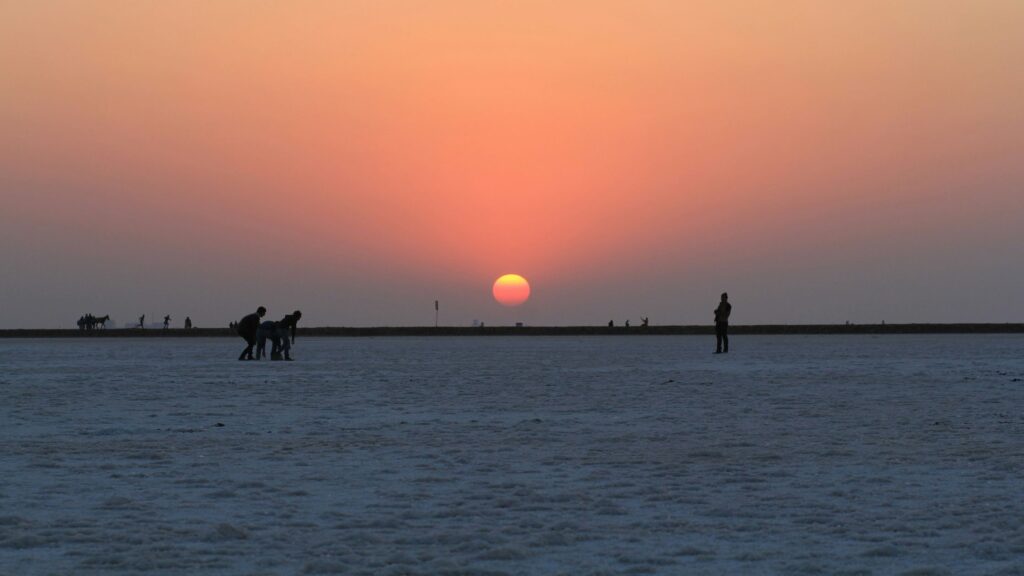Rann of Kutch is one of the most famous tourist attractions because it’s a 27,454 km² salt desert in Gujarat, India. At the same time, it is a unique place that is a product of both time and geographical changes. It teaches us much about ecological and unique seasonal transformation, making an incredible natural wonder worth exploring. So, let’s examine the formation of Rann Of Kutch and what it teaches us about the Earth.
Geological Origins Of Rann Of Kutch
The formation of Rann of Kutch is the result of seismic activity. When the tectonic plates shift under the Earth’s surface, many changes occur. Moreover, the white desert is the result of the collision of the Indian plate with the Eurasian plate.
- Ancient Tectonic Activity
- Indus Delta Influence
- Fault Lines and Earthquake
The tectonic activity also has a huge Indus Delta influence on Rann of Kutch’s formation. The sedimentation from the Indus River also contributed to the land formation of the present-day white desert in Gujarat. On top of that, the area is a seismically active zone, and the impact of earthquakes has a greater effect on land elevation and salt marsh formation.
Marine History Of The Region
Scientific studies confer that the Rann of Kutch was once a shallow arm of the Arabian Sea. However, the upliftment and separation from the sea due to tectonic shifts resulted in salt marsh formation. Also, the area is a flat salt due to marine regression and sedimentation. Due to this, there is a high salt accumulation due to trapped seawater.
- Separation from the sea due to tectonic shifts.
- Marine regression and sedimentation.
- Accumulation of salt.
Climatic Conditions In Rann Of Kutch
Different seasons influence the state of the region. During monsoon season, the area is turned into a shallow wetland. On the other hand, the summer season’s heat leads to the formation of white salt flats. This is why the place appears white due to rapid evaporation in the heat.
- Monsoons means wetland.
- Complete drying in summer.
- Iconic white appearance.
What Is The Role Of Wind And Erosion?
The Rann of Kutch is subjected to winds coming from the ocean. These wind patterns heavily influence the terrain—the wind-driven sediment deposition contributes to salt spread in the region.
Biodiversity And Ecological Balance
You might wonder if no life form can sustain itself in a saline desert. However, this is not the case, as the place supports migratory birds (Flamingos) during the seasonal wetlands. Different flora and fauna are also adapted to this extreme environment.
The Cultural Connection Of People In Rann Of Kutch
The white desert is known for serving ancient trade routes, promoting the region’s growth. Furthermore, the place has helped indigenous communities adapt to the extreme terrain and celebrate festivals.
- Trade routes through the Rann.
- Home to Indigenous communities
- Nature’s marvel is rooted in science.
Final Thoughts Of Rann of Kutch
The Rann of Kutch, a 27,454 km² salt desert in Gujarat, India, is a unique natural wonder due to its geological origins, marine history, and climatic conditions. Its formation is influenced by seismic activity, ancient tectonic activity, and the Indus Delta’s influence. The region’s saline environment supports migratory birds and adapted flora and fauna. Finally, the white desert also serves as a cultural connection, serving ancient trade routes and allowing indigenous communities to adapt to the extreme terrain.
FAQs
What is special about Rann of Kutch?
The place is the largest salt desert in the entire world.
Why is Rann of Kutch called the White Desert?
It is also known as the White Desert because of its high salt content, which dominates the ample marshland.
Which river flows in Rann of Kutch?
Luni River.

